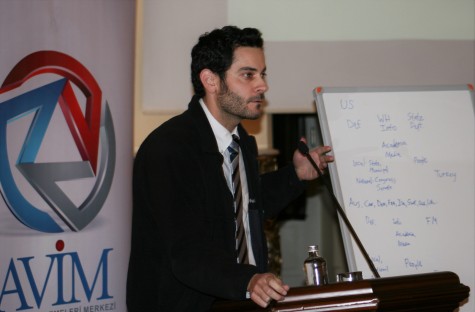Daily Sabah, 16 September 2015
American power to attract the public opinion now appears in the so-called Armenian genocide. Amal Clooney accuses Turkey of the so-called genocide with information produced by American sides as an agent of the same group
Raphael Lemkin considered dozens of cases involving massacres to be genocide. It is safe to suppose that this would have been an even higher number had Lemkin lived to see the United States bombing in Vietnam and Cambodia, among other more recent events. Despite Lemkin's proclivity to assign genocide to many instances of massacres throughout history, only one instance has been subject to a legal discussion regarding genocide without ever being defined as such in a competent court of law.
In the case of Perinçek v. Switzerland, the European Court of Human Rights (ECtHR) held that Doğu Perinçek should have been allowed by the Swiss authorities to enjoy the right to express himself freely about Ottoman history and characterize the Armenian suffering in ways other than genocide. The case was then brought before the Grand Chamber of the court, and while it is expected that the upcoming decision will also favor Perinçek, a platform had been created by the exhibition of the case for enhancing the discourse on genocide. In other words, the court of law might very well decide against the imposition of characterizing the 1915 events as genocide, but in the court of public opinion the mere existence of this case energizes the public about the issue and cements the selective language about it even further.
Producing the propaganda
Architects of the genocide accusation do not necessarily anticipate victories in courts of law at this stage, but rather they seek first to establish a popular language about the Armenian suffering as genocide. For them, the objective is to find ways to maintain a genocide-centric discourse. To a great extent, this is done through ill-researched yet highly advertised sources of information such as news items and books, despite the inherent weakness of the legal argument, and despite the high threshold that the U.N. set for what is to be termed genocide.
The staging of this platform in Europe is not without an American influence. In Switzerland, where the already publicized debate took on a legal spin, the U.S. has been influencing public opinion through international organizations such as the Massachusetts-based Facing History and ourselves, which indoctrinates the Swiss public according to an American-biased education on history. This American influence in Switzerland ought not be a surprise if one considers that Germany functions as Europe's economic powerhouse while being under American military control.
And Amal Clooney on the stage
Considering the involvement of American sources of information in the effort to disseminate a genocide discourse regarding the Armenian suffering, American tactics come into view. There are American ways through which to elevate the Armenian tragedy as a case of genocide in public opinion. By sustaining the discourse on Armenian victimhood, the U.S. is able to control the language on genocide in general, and to influence Turkish affairs in particular. This is accomplished not only by mobilizing Armenians through the activation of American-empowered scholars and political entrepreneurs of Armenian heritage, but also by utilizing American power to attract attention to selective information. The role of Amal Clooney, who in January represented Armenia before the Grand Chamber of the ECtHR, is an example of this.
Clooney's utilized fame embodies the American ability to affect public opinion without being subjected to scrutiny. She is not an American, and is ethnically a Lebanese Arab. Her credibility lies in not being easily associated with American interests, though it is the American media that has made her into the most recognizable human rights lawyer in the world. Her status as such is heightened by interviews conducted with her husband George Clooney, with or without her. In these interviews her image as a serious and dedicated defender of human rights is promoted without much critical thought.
Media support for Clooney
Recently on The Late Show with Stephen Colbert, George Clooney, who himself was presented by Colbert as a legitimate human rights activist, commented on how his wife outdoes him in the advocacy of just causes. The conversation with Colbert was structured in a way that establishes a credible reputation for Amal Clooney as a serious professional. In turn, the public that consumes the information given on such widely followed interviews, later readily accepts Amal Clooney as a source of information on human rights issues. This means that through Clooney's top position as a celebrity and human rights lawyer, it is possible to control, first, which cases of human rights get a high level of public attention, and second, which side of the human rights debate should get public support.
Clooney's celebrity status was utilized in the American-controlled media to bring attention to an American-controlled genocide discourse. For instance, on the popular search engine Bing.com, her image was placed on the reel through which the site suggests popular searches, and the caption put together the words "Armenian" and "genocide," as if a matter of fact. Similarly, The Associated Press ran an article headlined "Amal Clooney on legal team in Armenian genocide case," presenting the characterization of genocide as a matter of fact. The same headline then appeared on mainstream media outlets such as CBS News, the Chicago Tribune, CNN, the Daily Mail, MSN, New York's Daily News and Yahoo News. The result is that the public, which is in an uncritical mode while simply following an entertainment-induced interest in Clooney, internalizes controlled information on Ottoman history that is given through this crafty design. It is akin to the use of bait.
Thus, most Americans proceed to go about living their lives with the inclination to describe the Armenian suffering as genocide simply because of an accumulation of language-control gimmicks such as a headline that they saw while following a news item about an A-lister's wife. Instead of suspecting that their most recognizable sources of information are taking them for fools, these Americans suspect those whose views differ from what it is that they think they know about Ottoman history from skimming through gossip articles. These Americans would choose Clooney's view over Perinçek's.
This technique enables American agenda setters to highlight human rights issues of their choosing, simply by orchestrating her hiring as a barrister on a legal team. In order to attract attention to certain issues, and also direct public sentiment on them, Clooney may be taken on as a barrister to read out her lines just as her husband does in his movies. The cameras and coverage will follow, as they did in her representation of Armenia. All it takes is a few minutes of display of oratory skills by Clooney and many people are then influenced into adopting a view on history that serves American interests.
No cynicism intended here, as this exact type of phenomenon has already been articulated by Joseph S. Nye, Jr. as a soft power tactic. Nye is a political scientist with substantial experience working for the U.S. government, and his definition of soft power describes what is done through Clooney: The U.S. has an uncanny ability to structure situations by using its power to attract people to its designated sources of information without being seen as doing so. The best way to persuade the public of an idea without it appearing as propaganda is by the utilization of those who are able to attract attention and appear as independent of the U.S. government.
As an agent of American soft power, Clooney is more effective in the court of public opinion than in the court of law. However, public opinion could be stirred into eventually affecting court decisions and lawmaking. Perinçek might win the case, but Turkey is losing the discourse. Turkey cannot rival American soft power, but it can be frustrated if made ineffective.
The work of skilled Ottomanists for an accurate depiction of Ottoman history will be recognized as an adequate discourse on the events of 1915 only after it becomes recognized that American power has been dominating the dissemination of information on this piece of history.
* Ph.D. candidate in Political Science at the University of Utah
© 2009-2025 Avrasya İncelemeleri Merkezi (AVİM) Tüm Hakları Saklıdır
Henüz Yorum Yapılmamış.
-
ABRAHAM FOXMAN’IN İTİBARI
Tal BUENOS 22.06.2014 -
 FRANCE'S GENOCIDE DEBATE: SOFT POWER THROUGH THE SEPARATION OF POWERS - DAILY SABAH
FRANCE'S GENOCIDE DEBATE: SOFT POWER THROUGH THE SEPARATION OF POWERS - DAILY SABAH
Tal BUENOS 19.04.2016 -
THE WAR OVER ARMENIAN IDENTITY - DAILY SABAH
Tal BUENOS 21.12.2015 -
THE LEMKIN HOLE IN THE SWISS CASE
Tal BUENOS 31.07.2014 -
THE RIGHT TO REFUTE
Tal BUENOS 24.04.2014
-
KKTC DAVA EDİLDİ
Ata ATUN 31.05.2012 -
ERMENİ ARAŞTIRMALARI ÖZEL SAYISI – "ERMENİLERİN SOYKIRIMI SAVINI YADSIYANLARI CEZALANDIRMAK VEYA TÜRKİYE’DEN TAZMİNAT ALMAK AMACI İLE YAPTIKLARI YARGI MÜCADELELERİ”
Pulat TACAR 13.08.2015 -
 THE GREEN POLICY OF TÜRKİYE AND ITS PROGRESS - 23.10.2023
THE GREEN POLICY OF TÜRKİYE AND ITS PROGRESS - 23.10.2023
Deniz ÜNVER 23.10.2023 -
 WHAT TO KNOW ABOUT THE IRAQ-TURKEY-EUROPE DEVELOPMENT ROAD PROJECT - WILSON CENTER - 11.06.2024
WHAT TO KNOW ABOUT THE IRAQ-TURKEY-EUROPE DEVELOPMENT ROAD PROJECT - WILSON CENTER - 11.06.2024
Burak YILDIRIM 12.06.2024 -
WERE THE ARMENIANS ‘ÜBER-JEWS’? - DRPATWALSH.COM - 26.02.2016
Pat WALSH 21.03.2016


